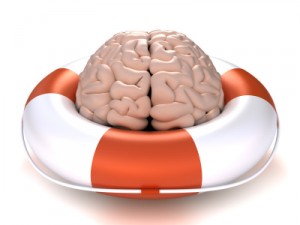Turing, Flynn, and Numbskull

I need a life preserver.
In 1950, Alan Turing proposed a test to determine if a computer is artificially intelligent – or at least as intelligent as a human. A judge sits in a room with two computer terminals. One terminal connects to a human; the other connects to a computer. The judge carries on conversations through both terminals. If the judge cannot tell which terminal connects to a human and which to a computer, then the computer has passed the test. It’s intelligent.
There are, of course, two ways that a machine could pass the Turing test. On the one hand, machines might get smarter. On the other hand, people might get dumber. We believe that machines are indeed getting smarter. Apparently, people are getting dumber, too.
But wait, you say — Jim Flynn has documented that people are getting smarter, at least as measured by IQ. Flynn has shown that average IQ scores rose consistently during the 20th century in countries all around the world. On average, the increase was about three points per decade, but it rose as high as 7.7 points per decade in postwar Japan. This trend has become known as the Flynn Effect. (See also here).
Why did we get smarter in the 20th century? Nobody really knows but we assume that it’s a byproduct of better health, nutrition, and education. If so, we should see greater gains among the most disadvantaged people in any given country. And indeed, as New Scientist points out, that seems to be what happened in places like Denmark (which has a very rich trove of IQ tests). IQ scores for disadvantaged people increased consistently while scores for people who already were better off hardly budged at all. The low end was closing the gap with the high end.
At the same time, we were also getting taller. It seems logical to guess that improving health, nutrition, and environment caused us to become both taller and smarter. But average height seems to be leveling off now. Does that mean that average intelligence will do the same?
Actually, intelligence seems to be dropping. In Denmark, average IQ may have dropped 1.5 points since 1998. Other studies have found similar results in places like Australia, Finland, Sweden, and the UK.
Is this cause for worry? Jim Flynn doesn’t think so. He thinks the difference could be due to chance or to small changes in social and economic variables. It may just be an anomaly in the data.
But wait, there’s more to think about:
- Michael Woodley suggests that our average reaction times have dropped since the Victorian era. If true, we’re not as quick on the uptake as we used to be. Reaction time correlates (weakly) with general intelligence so perhaps we’re getting dumber as well as slower. (See also here).
- Richard Lynn and others have argued that smarter people have fewer kids and thus fail to pass along their genetic advantages. Over time, this would result in lower average intelligence in the population.
- Bruce Hood argues, in The Domesticated Brain, that our brains have shrunk by about the size of a tennis ball over the last 20,000 years. We know that the brains of cats and dogs shrank as they were domesticated; perhaps ours did, too.
It’s fair to point out that all of the data sets have some issues. Perhaps Victorian scientists measured reaction times differently than we do. If our brains are smaller than they were 20,000 years ago does that mean we’re dumber or could we be doing more with less? Do smart people really have fewer kids? Is that really what the data show or is it a popular but erroneous meme?
What’s it all mean? Hard to say exactly. I think I’ll go eat some blueberries, oily fish, and broccoli. That should make me smart enough to take the Turing test.